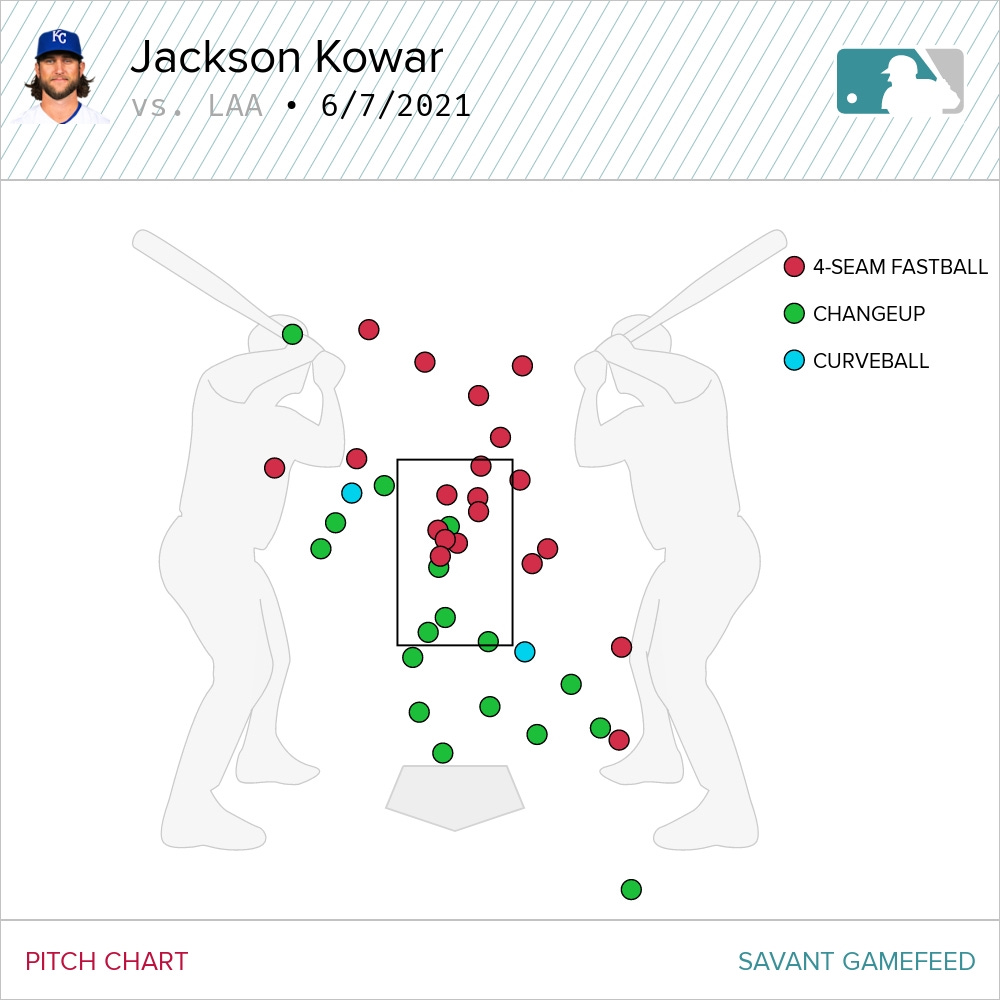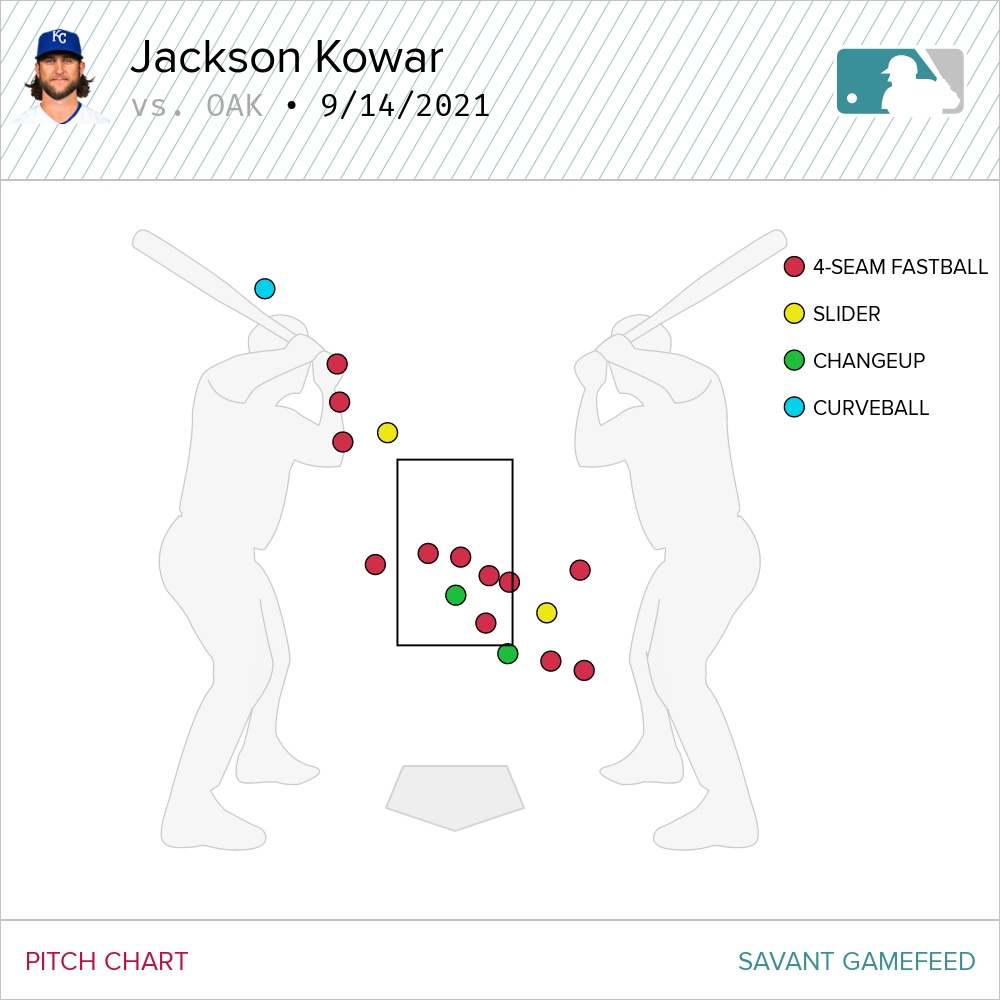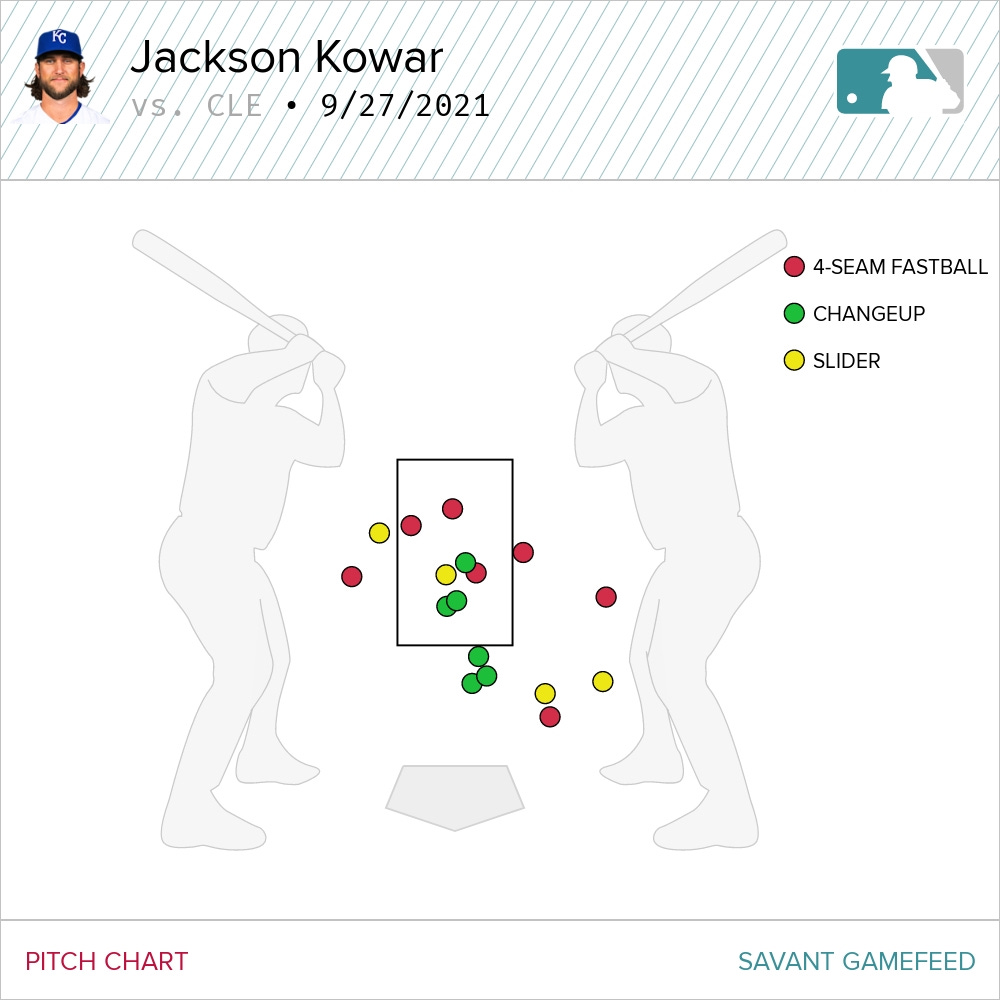Jackson Kowar and the trouble with the first
It was another poor start for Kowar, who once again got touched up in the game's opening frame. I sense a trend.
The first of four games against Cleveland this week got off to a rocky start. The bats were firing early, but they could not overcome yet another rough outing from Jackson Kowar. The Royals lost 8-3 and now fly home for the season’s final homestand with the first three games against this same Cleveland ballclub.
Jackson Kowar’s trouble in the first
Once is happenstance. Twice is coincidence. Three times is enemy action.
-Ian Fleming
Let’s take a trip back through Kowar’s starts in the majors this year, with a specific focus on the first inning.
June 7 @ LA Angels
7 batters faced, 3 singles, 2 walks, 3 wild pitches, 4 runs
39 pitches
This was the second-worst start from any Royal pitcher this year. But it was his major league debut. Emotions are running high. As Sir Ian says, once is happenstance.
I wrote about it at the time, the adrenaline was obviously off the charts. He has zero fastball control, flying way out of the zone or spotting it down the chute when he needed to throw a strike. Same for his change which was spiking well in front of the plate.
June 12 @ Oakland
7 batters faced, 2 singles, 2 walks, 1 run
34 pitches
Improvement! Sort of. The wheels fell off in the second inning in this start—Kowar recorded just one out in the following frame—but we’re not focusing on that. And hey! No wild pitches.
Here, he didn’t mix his pitches as much as he did in his debut. But the fastball was still running high. At least he was staying out of the middle of the zone. The changeup was really too elevated, though. That would bite him in the second inning as he caught more of the zone with that pitch.
After a decent relief outing in a mop-up role a few days, Kowar was sent back to Omaha to try to get right. His return when rosters expanded in September against this same Cleveland team went much better.
Sept 1 vs Cleveland
4 batters faced, 1 single
19 pitches
Kowar allowed a leadoff single to start the game and picked him off first. Around that out, he recorded a strikeout and a pop out. This was a very promising outing from Kowar.
This is what you want to see. His first pitch of the game was that middle-middle fastball that was taken for a strike. Man, after the abuse he endured in his first two starts, that pitch had to have been a massive victory. The low changeups were thrown when he was ahead in the count and fouled off. The fastballs were up and on the edges, most for strikes.
Kowar wobbled a bit in the fifth and sixth, but finished his night with back-to-back strikeouts. That first inning went a long way to his success in that start.
Sept 7 @ Baltimore
7 batters faced, 1 single, 1 home run, 2 walks, 4 runs
31 pitches
Kowar went to a full count on the first two batters and lost them both on walks. He almost escaped with allowing just a run, but surrendered a three-run dinger to DJ Stewart on a 1-1 pitch.
A lot of fastballs in the middle, but really those weren’t being put in play. The Stewart home run came on the changeup down and in the zone, so it’s not like that was a particularly poor pitch. Just a hitter grabbing hold of one.
What you see here is the presence of the slider. Recall, Kowar started throwing that pitch when he went back to Triple-A. He brought it back with him and found some success with it in that start against Baltimore. Overall, he gave up six runs on the night, but the slider was impressive.
Sept 14 vs Oakland
5 batters faced, 1 double, 1 walk, 2 runs
17 pitches
A rather unique first as Kowar allows the first two batters to reach via a walk and a double. The A’s then hit back to back sacrifice flies to score both runners.
Fewer sliders in the first than in his previous start. (He threw only one more all game.) That’s probably because this start mirrored his previous outing against Oakland in that, while touched for a bit of damage in the first, the A’s really hurt Kowar in the second. Again, he couldn’t complete two as he totally lost his ability to control the fastball. Three walks and back to back singles ended his night.
Against Oakland this year, Kowar has made two starts, thrown a total of 2.1 innings, allowed eight hits, seven walks…and nine runs.
September 19 vs Seattle
7 batters faced, 2 doubles, 2 walks, 2 runs
31 pitches
Not all doubles are created equal. One, off the bat of Ty France, was a blooper down the right field line that left the bat at 73 mph. The other, off the bat of Jarred Kelenic following two walks that loaded the bases was blistered to the right-center gap at 108 mph.
The walks were definitely frustrating to watch. But let’s focus on the doubles. The first one, the blooper, came of the change that Kowar located in the middle of the zone. It came on a 1-2 pitch that sped up France’s bat. Good idea to throw the pitch. Poor command.
The second double was on the fastball that was down on the bottom part of the zone. On a 2-2 pitch, it was really in a perfect location. The execution was there, the result wasn’t. The damage was done because Kowar, by issuing the walks after the first double, didn’t leave himself an wiggle room.
September 27 at Cleveland
5 batters faced, 2 doubles, 2 runs
18 pitches
And now the latest…
Those elevated changeups will kill ya. In this instance, Kowar got away with two of them, but the third went for one of those doubles. The first three put in play by Cleveland batters were classified as hard-hit (they left the bat at a velocity greater than 95 mph).
The theme, once again, was fastball command. Kowar has frequently struggled right out of the gate with locating his fastball. He’s either in the middle of the plate or way off the edges. As you would expect, the book is out on Kowar. Identify the direction of the pitch coming out of his hand, pick up that fastball, and if it’s coming in, it’s going to be pretty damn close to middle-middle. Take a rip. If it’s flying out of the zone, it’s an easy take because it’s not even close.
While Kowar was able to work into the fifth, the entire game was a grind. He gave up two more doubles in the second and a dinger in the third. The fastball command was a challenge for him all afternoon.
Just so many pitches living in the middle. Looking at this chart, it’s not surprising that Cleveland tallied five extra base hits against Kowar on the afternoon. The surprise is they didn’t do more damage. Kowar himself expressed frustration after the game.
“I just thought my fastball command was really poor. I mean going into the game I put a big emphasis on being aggressive and being aggressive in the zone, but for me it doesn’t mean being aggressive down the middle, it means executing the corners and thirds…When I got hurt it was just a lot of center-cut, thigh-high stuff and that’s not going to work.”
It adds up, doesn’t it? Kowar wants to dot the edges with the fastball, but set up shop right down the chute. This is what Kowar was talking about.
That was probably Kowar’s best pitch of the afternoon, a 95 mph four-seamer on the black for a called strike three. It was also his last pitch because he had once again loaded the bases with no outs.
That he never found his command with the four-seamer meant his outing was always going to be abbreviated. The damage in the first isn’t a trend that is limited to just that inning. It’s a snapshot of a broader issue that’s mostly limiting his starts to short outings. It’s been rare that he’s come out locating that fastball. He’s been able to find that command on occasion, but nowhere near often enough.
Kowar has made seven starts. He’s pitched into the third inning in just four of those. His ERA in the first inning is a whopping 20.25. Opponents are hitting .464/.537/.750 against Kowar in the first. Sure, fastball command is a large part of the problem, but it’s not the only issue. Kowar’s numbers against opposing batters are even worse in the second. You didn’t think that was possible, did you? They’re hitting .478/.571/.652 against him in the second inning.
The first inning stick out because it’s the first. Kowar has been generally sub-par no matter the inning. He just gets hit around early and often that he doesn’t go deep into starts. It’s just been a disastrous debut season.
The Royals remain confident Kowar will play a role in the rotation going forward. But there’s a lot of work that has to be done.
Did Salvador Perez hit a home run?
He did not, but he did collect two hits and drove home the first two runs of the afternoon for the Royals.
You’re not going to get a lot of RBI discussion in this newsletter. But I will acknowledge that Perez is leading the league in that category, and has blown by his previous career-high for the stat.
Here is your up-to-date leaderboard for both home runs and RBI.
It’s going to come down to the wire.
Perez left Monday’s game after taking a foul ball off the mask. After the game he said he was fine and expects to be back behind the plate on Tuesday. As long as he stays healthy in this last week, Perez is going to finish the season playing at least 160 games. (I’m hedging here…If he goes on a dinger binge over the next five games, maybe he gets the final Sunday off. If the race for the home run or RBI title remains tight, he’s playing.) That is an amazing number of games played for a guy who spends three-quarters of his time behind the plate.
Up next
The series shifts to The K. The Royals have announced their starters for just the next two games.
Tuesday — Aaron Civale vs Brady Singer, 7:10 CDT
Wednesday — Zach Plesac vs Daniel Lynch, 7:10 CDT
Thursday — Shane Bieber vs TBA, 7:10 CDT













